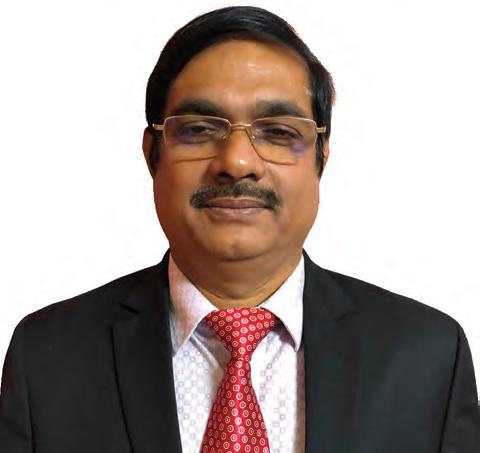
Q. Although young, Siksha 'O' Anusandhan has performed well in the NIRF. What do you attribute this to?
A. This performance can mainly be attributed to research and development -- a major component of the rankings. We have also done well on others such as teaching, but I will attribute most to research and development on which we have focussed more in the last 10 years.
We introduced full-time research scholarships. Now, we have 11 research scholars and are paying them Rs.20,000 per month. Then, we also selected good candidates and faculties from IITs [Indian Institutes of Technology] and NITS [National Institutes of Technology], especially in the engineering department. Our library budget right is now around Rs.5 crores.
We have also developed 58 research labs and 18 research centres in the contemporary areas of research. These include nanoscience and nanotechnology, material science, functional materials, health science and pharmacy, infectious diseases, tissue engineering, biomedical science, climate resilient crops, etc. Recently, we have started to focus on agriculture science.
These improved our research ecosystem. We allowed researchers to work through the night like those in national institutions.
Also, we encourage researchers to work with faculty from other partner institutions. This enhanced the number of our publications. 10 years ago, we had only around 300 published papers, now we have around 10,000. We have around 300 to 1,600 published papers per year across disciplines. Then, five years ago, we had zero patents and now we have over 420 filed. We are currently running 103 projects worth around Rs.30 crores.
We have started incentivising research with cash awards on publication in reputed journals and asked our faculty to ensure two research publications each year.
Q. You've been part of SOA since 2009. How has the university grown since then?
この記事は Careers 360 の July 2023 版に掲載されています。
7 日間の Magzter GOLD 無料トライアルを開始して、何千もの厳選されたプレミアム ストーリー、9,000 以上の雑誌や新聞にアクセスしてください。
すでに購読者です ? サインイン
この記事は Careers 360 の July 2023 版に掲載されています。
7 日間の Magzter GOLD 無料トライアルを開始して、何千もの厳選されたプレミアム ストーリー、9,000 以上の雑誌や新聞にアクセスしてください。
すでに購読者です? サインイン

100 Best Business Schools In The Country
For Careers360's 2025 B-school ranking, we ranked 100 public and private management institutions and rated over 500, dividing them into zones and city clusters

'We have a completion rate of 80-90%'
During an interaction, Mayank Kumar, co-founder and managing director of upGrad, spoke to Sheena Sachdeva about new courses in accounting and management, the profile of learners, trends in online MBA courses, and more. Edited excerpts from the conversation below

New roles and spaces
Online MBA has helped many working professionals climb up the office hierarchy or even pivot to an entirely new career. But there are challenges.

'Committed to industry-relevant learning'
International Management Institute (IMI), New Delhi, is India's first corporate-sponsored B-school. It offers three PG diplomas in management - the flagship PGDM with 300 seats, as well as human resource management and business and financial studies with 60 each. Himadri Das, director general, IMI, discussed the challenges posed by competition among private business schools, the importance of diversity, and IMI's NIRF rankings with Sanjay. Edited excerpts from the interview.

National Insurance Academy plans expansion to meet rising demand
The National Insurance Academy (NIA), now situated in Pune, was established jointly by the ministry of finance and all the major public sector undertakings (PSUs) in insurance. Originally a training institute for insurance industry professionals, it has been offering a postgraduate diploma in management (PGDM) since 2004 and has placed 100% of its students all through.

The era of MBA in sustainability
As companies are increasingly pushed to meet environmental compliances, management institutes are revamping their curricula with specialised MBA programmes in sustainability or launching new programmes

Despite good record, SRCC's PGDM faces degree hurdle
Delhi University's Shri Ram College of Commerce started its postgraduate diploma in Global Business Operations (GBO) 25 years ago. Principal Simrit Kaur spoke to Shradha Chettri on their effort to convert the diploma into a degree programme, changes required in the National Institutional Ranking Framework (NIRF) and more. Edited excerpts

Managing produce, from farm to plate
Agribusiness managers are in great demand, both on the 'input' side of agriculture - seeds, fertilizer, machinery businesses - as well as in the processing of the 'output'

Creating 'innovators with conscience'
The SP Jain Institute of Management and Research (SPJIMR), Mumbai, has been the top Indian institution in the Financial Times' (FT) Masters in Management rankings for two years in a row. Varun Nagaraj, dean of SPJIMR, spoke to Atul Krishna about what the institute does differently, its plans, the future of business education, and the FT and National Institutional Ranking Framework (NIRF) lists. Edited excerpts below

'Quality management education that is equitable': FMS Dean
The Faculty of Management Studies (FMS) at the University of Delhi (DU) is one of India's premier business schools offering MBA courses at a relatively low cost, compared to most leading business schools in India. Celebrating its 70th year, it is also one of the first university-based business schools. In an interview with Sanjay, head and dean of FMS A Venkat Raman spoke about the functioning of a business school under a central university, challenges, courses and future plans. He also spoke on the Common Admission Test (CAT) and its impact on diversity in student cohorts. Edited excerpts